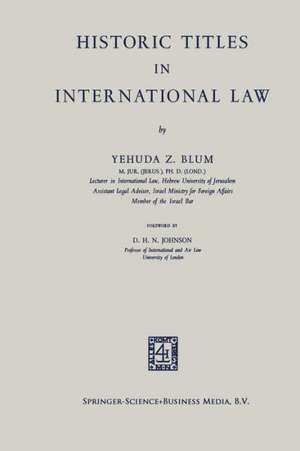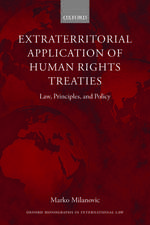Historic Titles in International Law
Autor Yehuda Z. Blumen Limba Engleză Paperback – 1965
Preț: 393.35 lei
Nou
Puncte Express: 590
Preț estimativ în valută:
75.27€ • 78.14$ • 62.77£
75.27€ • 78.14$ • 62.77£
Carte tipărită la comandă
Livrare economică 22 martie-05 aprilie
Preluare comenzi: 021 569.72.76
Specificații
ISBN-13: 9789401502016
ISBN-10: 9401502013
Pagini: 388
Ilustrații: XXIV, 360 p.
Dimensiuni: 155 x 235 x 20 mm
Greutate: 0.54 kg
Ediția:Softcover reprint of the original 1st ed. 1965
Editura: SPRINGER NETHERLANDS
Colecția Springer
Locul publicării:Dordrecht, Netherlands
ISBN-10: 9401502013
Pagini: 388
Ilustrații: XXIV, 360 p.
Dimensiuni: 155 x 235 x 20 mm
Greutate: 0.54 kg
Ediția:Softcover reprint of the original 1st ed. 1965
Editura: SPRINGER NETHERLANDS
Colecția Springer
Locul publicării:Dordrecht, Netherlands
Public țintă
ResearchCuprins
I. Introduction.- 1. The acquisition of territory: the evolution of the modern concept.- 2. The acquisition of territory: the differing approach of academic and practising lawyers.- 3. The various modes of acquiring territory — Classification.- 4. Plan of the work.- II. Prescription in International Law.- 5. The distinction between acquisitive prescription and extinctive prescription.- 6. Prescription as a private law concept.- 7. Private law concepts in international law.- 8. Divergence of the definition of prescription between the continental and English legal systems.- 9. Prescription in municipal law — Roman law.- 10. Prescription in municipal law — English law.- 11. Prescription in municipal law — Conclusions.- 12. Doctrinal reasons for the existence of prescription in international law.- 13. The existence of prescription in international law ? Opinions of writers.- 14. The existence of prescription in international law — Judicial decisions rendered by international tribunals.- 15. The existence of prescription in international law — Judicial decisions rendered by municipal courts.- 16. The existence of prescription in international law — Practice of States.- III. Acquiescence as the Juridical Basis of an Historic Title.- 17. General.- 18. The creation of a customary rule of international law — The generality of practice and the time element.- 19. The creation of a customary rule of international law — Opinio jurisand acquiescence.- 20. The consensual basis of customary international law.- 21. Recognition and acquiescence.- 22. The role of the time element in the creation of special customary or “historic” rights.- 23. Some historic rights viewed as remainders of more extensive ancient rights.- 24. Non-exclusive historic rights.- 25.Acquiescence versus prescription as the legal basis of historic rights.- 26. Acquiescence as the juridical basis of historic rights — Opinions of writers.- 27. Acquiescence as the juridical basis of historic rights — Opinions of learned bodies.- 28. Acquiescence as the juridical basis of historic rights — Decisions of international tribunals.- 29. Acquiescence as the juridical basis of historic rights — Decisions of municipal courts.- 30. Acquiescence as the juridical basis of historic rights — State practice.- 31. Acquiescence and estoppel.- IV. The Requirements for the Formation of an Historic Title and its Constituent Elements.- 32. Introductory.- 33. Effective display of State authority — General.- 34. Effective display of State authority — The notion of continuity in respect of territorial situations.- 35. Effective display of State authority — Intention and will to act as sovereign.- 36. Effective display of State authority — Manifestations of State sovereignty.- 37. Effective display of State authority — Possession à titre de souverain.- 38. Acquiescence in the display of State authority — General.- 39. Acquiescence in the display of State authority — The meaning of “acquiescence”.- 40. Notoriety of territorial situations.- 41. Is notification a prerequisite of notoriety?.- 42. Constructive knowledge.- 43. The plea of excusable ignorance.- 44. The relevance of protest to the formation of an historic title.- 45. The conditions for the validity of a protest.- 46. Anticipatory protest.- 47. Protest as a bar to the acquisition of an historic title.- 48. The repetition of protest.- 49. The relevance of the protest of a single State.- 50. Lack of protest does not always indicate acquiescence.- 51. The geographical element in the formationof an historic title.- 52. The role of “legitimate interests” in the formation of an historic title.- 53. The role of the time element in the formation of an historic title.- V. Miscellaneous Problems of Interpretation and Evidence Relating to the Acquisition of an Historic Title.- 54. General.- 55. The application of intertemporal law in the interpretation of an historic title.- 56. The selection, of the “critical date”.- 56. 57. The relative strength of competing claims.- 58. The burden of proving an historic title.- 59. Strict geographical interpretation of an historic title.- VI. Juridical Aspects Specifically Related to the Formation of Maritime Historic Titles.- 60. General.- 61. The impact of the principle of the freedom of the high seas on the formation of maritime historic rights.- 62. What is international acquiescence?.- 63. Manifestations of State authority over maritime areas.- 64. Historic waters — Historic bays in general.- 65. Can multinational bays be claimed as historic bays?.- 66. The effects of territorial changes along the coast of a bay.- 67. Historic waters other than historic bays — Historic rights of delimitation.- 68. Historic waters other than historic bays — Water areas lying within and around island formations.- 69. Historic waters other than historic bays — Historic rights to a greater breadth of the territorial sea.- 70. The juridical status of historic waters — Historic waters are internal waters.- 71. The juridical status of historic waters — The distinction between internal inland waters and internal non-inland waters.- 72. The juridical status of historic waters — Multinational bays.- 73. Non-exclusive historic rights over maritime areas.- 74. Historic rights of fishing.- 75. Are claims to the sea-bed and subsoilof an “historic” character ?.- 76. Sedentary fisheries as historic rights.- VII. Conclusions.- 77. Consolidation as the legal root of historic titles.- 78. Critical appraisal of the doctrine of historic titles.- Appendix — Uti possidetis in international law.- Selected bibliography.- Index of Names.- General Indepc.












